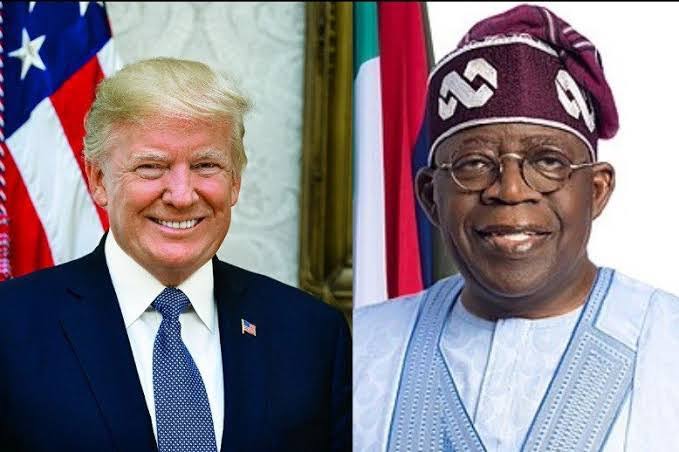Nigeria’s long-standing trade relationship with the United States has taken a sharp hit, with fresh data showing imports from Africa’s biggest economy fell by more than 40 percent in July, raising alarm about the country’s weakening foothold in one of its most strategic markets.
Figures from the US Census Bureau and Bureau of Economic Analysis reveal that Nigerian exports to America plunged from $639 million in June 2025 to $379 million in July, a 41 percent plunge in just one month.
The sudden downturn coincided with Washington’s introduction of new tariffs under President Donald Trump’s “reciprocal” trade policy. The measures, announced in late July, raised levies on Nigerian goods from 14 to 15 percent, targeting countries that maintain trade surpluses with the United States.
The effect was immediate and stark. Non-oil Nigerian exports, ranging from agricultural produce to manufactured goods, were hit hardest, with many US buyers halting or delaying orders amid uncertainty over tariff enforcement. Although crude oil, which dominates Nigeria’s exports to the US, has been partly shielded, the ripple effects of the policy created a chilling effect on demand.
At the same time, American exports to Nigeria also contracted, slipping from $919 million in June to $584 million in July. Yet the US still maintained a trade surplus of $206 million for the month, only slightly below June’s $280 million.
Year-to-date, US’ edge remains intact. Between January and July 2025, it exported $3.92 billion worth of goods to Nigeria while importing $3.14 billion, leaving a cumulative surplus of $781 million.
The broader African picture painted a mixed story. US imports from the continent rose from $3.67 billion in June to $4.47 billion in July, while exports slipped marginally to $3.30 billion. That swing left America with a $1.17 billion trade deficit in July, a sharp reversal from a $302 million deficit the previous month.
Country-level data showed contrasting outcomes. Trade with Egypt remained in Washington’s favour, with $847 million in exports against $290 million in imports. But South Africa widened the gap, shipping $1.99 billion worth of goods to the US against exports of only $565 million, deepening America’s monthly deficit to $1.42 billion and bringing the cumulative shortfall with Pretoria to $7.74 billion for the year.
For Nigeria, the sudden collapse in exports has triggered debate about the resilience of its trade strategy and its ability to withstand shocks from major partners.
The Minister of Industry, Trade and Investment, Jumoke Oduwole, signaled that Nigeria would not retaliate against the tariff hike but instead focus on domestic reforms.
“Nigeria remains responsive; we’re not reacting. We’re focused on the eight-point agenda of President Bola Tinubu. We will continue to support domestic investors and expand market access for Nigerian businesses,” she said.
Oduwole pointed to the African Continental Free Trade Area (AfCFTA) as a key pillar of Nigeria’s long-term strategy. She highlighted that non-oil exports grew 24 percent year-on-year in the first quarter of 2025, evidence that Abuja’s diversification drive is beginning to yield results.
Economists and business leaders, however, say Nigeria must tread carefully. Development economist Dr. Aliyu Ilias argued that the setback could become an opportunity if properly managed.
“Trump’s tariff is not only for Nigeria. The advantage is that we are now exporting more overall, which is positive for us,” he said, urging stronger trade ties with BRICS nations and Asian partners where demand for Nigerian products is expanding.
Dr. Muda Yusuf, Chief Executive of the Centre for the Promotion of Private Enterprise, played down the immediate consequences of the US decision.
“Our trade with the US is not that strategic. When anything goes wrong, it is not as if it can have any fundamental effect on our economy,” he explained.
He stressed that Nigeria’s exports to the US remain dominated by crude oil and a handful of commodities, limiting the potential damage to the broader economy. In Yusuf’s view, non-tariff barriers, particularly Washington’s restrictive visa policy, which curtails business travel and investment inflows are a bigger long-term obstacle than tariffs.
Still, July’s steep fall underlines Nigeria’s vulnerability in an increasingly volatile trade landscape. While America has long been a key partner, China, India, and European countries now dominate Nigerian trade flows, leaving Washington’s role less central than it once was.
Yet the symbolism of a sharp downturn with the world’s largest economy is difficult to ignore. Analysts note that Nigeria’s traditional trade surplus with the US has steadily eroded, replaced by an American surplus that reflects Abuja’s shrinking market access.
For Nigeria’s policymakers, the challenge is two-fold: to deepen diversification under the AfCFTA and to cultivate new partnerships in Asia, the Middle East, and Latin America that can offset volatility from Washington.
As one senior trade official put it privately, “This is less about Trump and more about the direction of the world economy. Nigeria cannot afford to depend on a single market. Our future lies in diversifying both what we produce and where we sell it.”
For now, as Oduwole insisted, the Federal Government is choosing reform over retaliation.
“We will continue to support domestic investors and expand market access for Nigerian businesses,” she said.

